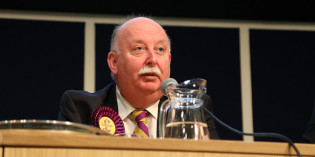
Time for the media shadow boxing to end, and for the democratic deficit in the expansion of the UK’s surveillance powers to be tackled
Since the Snowden revelations, the extent of the UK’s surveillance powers has come into sharp focus. This has been justified by the government and the security agencies themselves as being the necessary cost of freedom in an age of grave uncertainty and risk. Andrew Murray argues that the media ‘shadow boxing’ that has gone on […]

The nature of modern political rhetoric is a big reason that voters were turned off by the turgid 2015 General Election
Politics is an art which takes place largely through the exchange of written and spoken words, with some of the greatest politicians also excellent speakers and rhetoricians. But thanks to mass – and now digital – media, the nature of political rhetoric has changed. Alan Finlayson traces the changes in the form of political rhetoric since […]

The delay in appointing a new Intelligence and Security Committee threatens to undermine its work before it has even begun
In February of this year, the then-Chair of the Intelligence and Security Committee (ISC) – the body which oversees the UK’s three main intelligence agencies – was caught in a journalistic sting operation. Since then, the ISC seems to have been inactive. It is now two months since the General Election and the Government (who […]

Greek lessons for the UK’s referendum
What lessons can the UK derive from the Greek referendum ahead of its own vote on EU membership? Richard Rose writes that there were four key flaws in the Greek referendum that the UK should aim to avoid: an unclear question, a rushed campaign, the tendency to downplay the influence of other EU states over […]

Making the breakthrough into Parliament boosts the electoral success of smaller political parties
Establishing the impact of legislative representation on parties’ subsequent electoral outcomes is very difficult due to how different parliamentary and non-parliamentary parties look. To address this problem, Elias Dinas, Pedro Riera and Nasos Roussias used an element that is quite common in multiparty systems – that is, legal thresholds of representation at the national level- and […]

‘English Votes for English Laws’ —a viable answer to the English Question?
Daniel Gover and Michael Kenny outline the government’s detailed proposals for introducing EVEL that were published last Thursday. They argue that, while incremental and modest in some respects, the proposals do raise wider points of constitutional principle which suggest English Votes could be the start rather than the end of a much longer process of […]

Only an approach founded on rights and obligations can allow for effective and legitimate public infrastructure provision
On Monday 23 March 2015, Dialogue by Design and the UCL Transport Institute co-hosted a seminar, We Need to Talk about Infrastructure, chaired by Jim Steer of Steer Davies Gleave. We posed a simple question: when Government plans to invest £375 billion in infrastructure projects up to 2020, how can this be done with local […]

Book Review: The Politics of Third Wave Feminisms: Neoliberalism, Intersectionality, and the State in Britain and the US
In The Politics of Third Wave Feminisms: Neoliberalism, Intersectionality, and the State in Britain and the US, Elizabeth Evans produces a volume that discusses the concept and practice of intersectionality and the impact of neoliberal policies on third wave Feminism in Britain and the US, writes Isabel Lopez Ruiz, who recommends it to anyone with a passing interest in Feminism, […]

Italy shows that the pursuit of regional autonomy within a federal structure can backfire
Talk has been rife in recent months about discussion of some variant of United Kingdom federalism, particularly in the wake of the Government’s decision to attempt to introduce English Votes for English Laws. But how practical is federalism? Angelo Salento explains how the creation of a new kind of federal union went wrong in Italy. […]

New child poverty measures could allow government to shirk its responsibilities
Abandoning the child poverty targets will damage the interests of disadvantaged children, and represents a significant step back in attempts to make Britain a fairer society, argue Kitty Stewart, Tania Burchardt, John Hills and Polly Vizard. Similar PostsBook Review: Strangers at our Door by Zygmunt BaumanThe survival of power sharing and devolution through another crisis is […]




 Democratic Audit's core funding is provided by the Joseph Rowntree Charitable Trust. Additional funding is provided by the London School of Economics.
Democratic Audit's core funding is provided by the Joseph Rowntree Charitable Trust. Additional funding is provided by the London School of Economics.